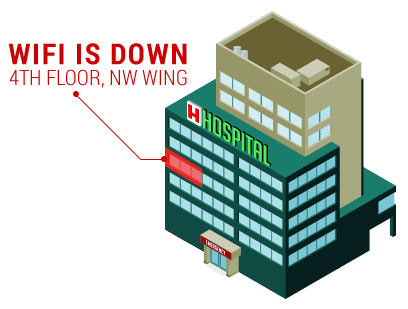 When it comes to choosing the right WiFi solution for your healthcare facility, there are several factors to consider. From the number of devices and users, to the type of data being transmitted and the level of security required, selecting the right solution can be a daunting task. In this blog post, we will explore the key considerations and provide some practical tips to help you choose the right WiFi solution for your healthcare facility.
When it comes to choosing the right WiFi solution for your healthcare facility, there are several factors to consider. From the number of devices and users, to the type of data being transmitted and the level of security required, selecting the right solution can be a daunting task. In this blog post, we will explore the key considerations and provide some practical tips to help you choose the right WiFi solution for your healthcare facility.
Why WiFi is important in healthcare:
WiFi has become an essential part of modern healthcare. It enables healthcare providers to access and share critical information quickly and easily, improving the quality and efficiency of patient care. WiFi also allows healthcare staff to use a range of mobile devices, such as laptops, tablets, and smartphones, for tasks such as electronic health record (EHR) access, remote monitoring, and telemedicine.
In addition, WiFi can help healthcare facilities to improve operational efficiency and reduce costs. For example, by providing WiFi to patients, healthcare facilities can offer a more comfortable and convenient experience, leading to higher patient satisfaction and fewer complaints. WiFi can also be used to enable the use of medical devices, such as infusion pumps and vital sign monitors, reducing the need for hardwired connections and lowering the risk of infection.
Key considerations when choosing a WiFi solution:
When choosing a WiFi solution for your healthcare facility, there are several key considerations to keep in mind. These include:
-
Number of devices and users: The first consideration is the number of devices and users that will be connected to the WiFi network. This will determine the size and capacity of the WiFi solution you need, as well as the number of access points and other hardware required. It's important to consider not only the current number of devices and users, but also any future growth or expansion.
-
Type of data: The type of data being transmitted over the WiFi network is another important consideration. Healthcare facilities handle a wide range of sensitive data, including patient health information, financial records, and personnel records. This data needs to be transmitted securely and in compliance with regulations such as HIPAA.
-
Security: Security is a critical consideration for any WiFi solution in a healthcare facility. The network needs to be protected against unauthorized access and data breaches, and must be able to withstand potential cyber attacks. In addition, healthcare facilities often have specific security requirements, such as the need for authentication and encryption.
-
Coverage and reliability: The coverage and reliability of the WiFi solution is also important. In a healthcare setting, it's essential that the WiFi network is available at all times, with minimal downtime or interference. This means choosing a solution that can provide coverage throughout the facility, including in areas with concrete walls or other obstacles.
-
Scalability and flexibility: Healthcare facilities often need to expand or adapt their WiFi networks over time, as their needs and requirements change. When choosing a WiFi solution, it's important to consider the scalability and flexibility of the solution, and whether it can be easily expanded or reconfigured to meet future needs.
-
Support and maintenance: Finally, the support and maintenance provided by the WiFi solution provider is an important consideration. Healthcare facilities need to ensure that any issues or problems with the WiFi network can be addressed quickly and efficiently, without disrupting patient care.
Practical tips for choosing the right WiFi solution:
Based on the key considerations discussed above, here are some practical tips to help you choose the right WiFi solution for your healthcare facility:
- Conduct a thorough assessment: Before choosing a WiFi solution, it's important to conduct a thorough assessment of your healthcare facility's needs and requirements. This should include an analysis of the number of devices and users, the type
-
Choose a reputable and experienced provider: When choosing a WiFi solution provider, it's important to select a company that has a proven track record and experience in providing WiFi solutions for healthcare facilities. Look for a provider that offers a range of solutions and can provide expert guidance and support.
-
Consider a managed WiFi solution: A managed WiFi solution can provide numerous benefits for healthcare facilities. With a managed solution, the provider takes care of all aspects of the WiFi network, including installation, maintenance, and support. This can help to ensure that the network is always up and running, and can reduce the burden on your IT staff.
-
Don't forget about WiFi 6: WiFi 6, also known as 802.11ax, is the latest generation of WiFi technology. It offers faster speeds, greater capacity, and improved security, making it ideal for healthcare facilities. When choosing a WiFi solution, consider whether it includes WiFi 6 technology and whether it's future-proofed for any upcoming changes in technology.
Conclusion:
In conclusion, choosing the right WiFi solution for your healthcare facility requires careful consideration and planning. By taking into account the key considerations and following the practical tips outlined in this blog post, you can ensure that you select a solution that meets the unique needs of your facility and supports the delivery of high-quality patient care.


